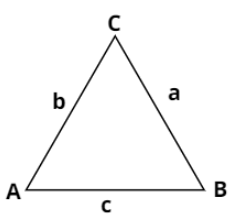Question
Question: In a triangle ABC, using the vectors, prove that \({c^2} = {a^2} + {b^2} - 2ab\cos C\)....
In a triangle ABC, using the vectors, prove that c2=a2+b2−2abcosC.
Solution
Hint: Analyse the situation with a figure. The side with length a is the side opposite to angle C. Assume the sides representing vectors, use polygons law of vectors and then simplify it further to get the desired result.
Complete step by step answer:

As we have ABC is a triangle then by using polygons law we can say that a+b+c=0
Then
a+b=−c
Now on squaring both sides, we get
⇒(a+b)(a+b)=(−c)(−c)
On applying dot product rule on RHS term we get
⇒b2+a2+2abcos(π−C)=c2
⇒a2+b2+2ab(−cosC)=c2
⇒c2=a2+b2−2abcosC
Hence we have proved that in a triangle ABCc2=a2+b2−2abcosC.
NOTE: The polygon law used above states that if three vectors, a,b and c are such that, a+b+c=0 then the vectors a,b and c will form a triangle.
